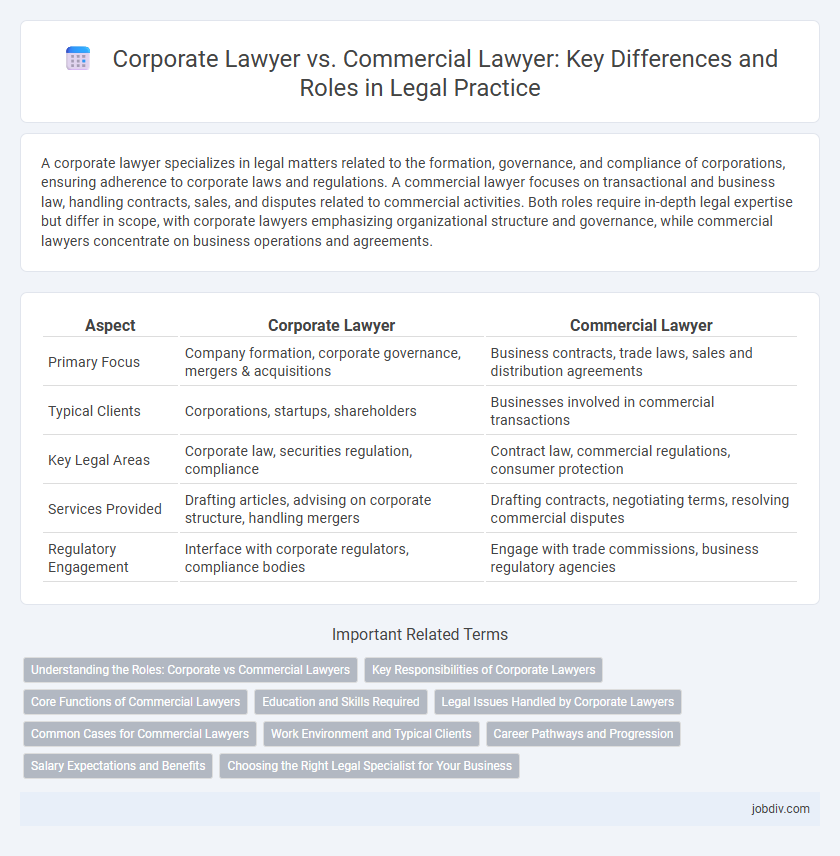A corporate lawyer specializes in legal matters related to the formation, governance, and compliance of corporations, ensuring adherence to corporate laws and regulations. A commercial lawyer focuses on transactional and business law, handling contracts, sales, and disputes related to commercial activities. Both roles require in-depth legal expertise but differ in scope, with corporate lawyers emphasizing organizational structure and governance, while commercial lawyers concentrate on business operations and agreements.
Table of Comparison
| Aspect | Corporate Lawyer | Commercial Lawyer |
|---|---|---|
| Primary Focus | Company formation, corporate governance, mergers & acquisitions | Business contracts, trade laws, sales and distribution agreements |
| Typical Clients | Corporations, startups, shareholders | Businesses involved in commercial transactions |
| Key Legal Areas | Corporate law, securities regulation, compliance | Contract law, commercial regulations, consumer protection |
| Services Provided | Drafting articles, advising on corporate structure, handling mergers | Drafting contracts, negotiating terms, resolving commercial disputes |
| Regulatory Engagement | Interface with corporate regulators, compliance bodies | Engage with trade commissions, business regulatory agencies |
Understanding the Roles: Corporate vs Commercial Lawyers
Corporate lawyers specialize in the legal framework governing businesses, handling mergers, acquisitions, corporate governance, and compliance with regulatory requirements. Commercial lawyers focus on contracts, trade, and business transactions, ensuring legal protections in commercial agreements and dispute resolution. Understanding their distinct roles helps businesses secure comprehensive legal support tailored to structural corporate matters versus everyday commercial activities.
Key Responsibilities of Corporate Lawyers
Corporate lawyers specialize in managing legal matters related to company formation, mergers and acquisitions, corporate governance, compliance with securities laws, and drafting shareholder agreements. They provide counsel on fiduciary duties, regulatory frameworks, and risk management to ensure lawful business operations and protect corporate interests. Their role involves negotiating contracts, overseeing corporate transactions, and advising executives on legal implications affecting corporate structure and strategy.
Core Functions of Commercial Lawyers
Commercial lawyers specialize in advising businesses on transactions, contracts, and regulatory compliance to ensure smooth commercial operations. Their core functions include drafting and negotiating contracts, managing mergers and acquisitions, and addressing issues related to intellectual property and competition law. They also provide guidance on corporate governance and dispute resolution to protect the commercial interests of their clients.
Education and Skills Required
Corporate lawyers require a Juris Doctor (JD) degree and bar admission, with advanced knowledge in corporate governance, mergers and acquisitions, and securities law. Commercial lawyers also hold a JD and bar license but specialize in contract law, trade regulations, and dispute resolution skills. Both roles demand strong analytical abilities, negotiation expertise, and proficiency in interpreting complex legal documents.
Legal Issues Handled by Corporate Lawyers
Corporate lawyers specialize in handling legal issues related to mergers and acquisitions, corporate governance, compliance with securities laws, and drafting shareholder agreements. They manage legal risks involved in business transactions, ensuring regulatory adherence and protecting company interests. Their expertise extends to advising on corporate restructurings, shareholder disputes, and fiduciary duties of directors.
Common Cases for Commercial Lawyers
Commercial lawyers frequently handle cases involving contract disputes, mergers and acquisitions, and regulatory compliance issues. Their expertise extends to negotiating sales agreements, drafting partnership contracts, and advising on intellectual property rights in business transactions. Common scenarios also include resolving disputes over trade practices and facilitating commercial litigation to protect clients' business interests.
Work Environment and Typical Clients
Corporate lawyers typically work within large law firms or in-house legal departments of corporations, advising multinational companies, startups, and shareholders on mergers, acquisitions, compliance, and governance. Commercial lawyers often operate in medium to large law firms or boutique practices, representing businesses of various sizes, including retailers, suppliers, and service providers, focusing on contracts, trade regulations, and dispute resolution. The work environment for corporate lawyers is fast-paced and transactional, while commercial lawyers engage in a mix of negotiation, drafting, and litigation support, serving clients involved in everyday business operations.
Career Pathways and Progression
Corporate lawyers typically begin their careers in law firms or corporate legal departments, specializing in mergers, acquisitions, and compliance, with progression opportunities into senior associate roles, partnership, or in-house counsel positions. Commercial lawyers focus on contract law, sales, and trade regulations, often advancing from junior legal roles to senior commercial counsel or legal advisor positions within businesses. Career pathways diverge as corporate lawyers gravitate towards strategic business governance while commercial lawyers deepen expertise in transactional and regulatory matters.
Salary Expectations and Benefits
Corporate lawyers typically earn higher salaries than commercial lawyers due to their involvement in complex mergers, acquisitions, and corporate governance, with average annual earnings ranging from $90,000 to $180,000 depending on experience and location. Commercial lawyers, specializing in business transactions and contract law, have average salaries between $70,000 and $140,000 but often benefit from bonuses linked to deal closures and client retention. Both roles frequently receive benefits such as health insurance, retirement plans, and professional development allowances, though corporate lawyers may access more extensive equity or profit-sharing options within large firms.
Choosing the Right Legal Specialist for Your Business
Corporate lawyers specialize in company formation, mergers and acquisitions, and regulatory compliance, providing tailored legal frameworks for business growth and risk management. Commercial lawyers focus on contracts, trade laws, and dispute resolution, ensuring smooth commercial transactions and protecting business interests. Selecting the right legal specialist depends on whether your business needs expertise in corporate governance or commercial negotiations to effectively safeguard your operations.
Corporate Lawyer vs Commercial Lawyer Infographic

 jobdiv.com
jobdiv.com